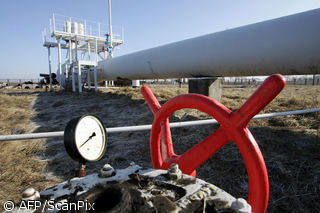The pensions question needs to be resolved between Poland and Eurostat and at some point there will be some form of agreement
Published:
19 October 2004 y., Tuesday
The pensions question needs to be resolved between Poland and Eurostat and at some point there will be some form of agreement.
MichaŠŠ DybuŠŠa, chief economist with BNP Paribas:
"The pensions question needs to be resolved between Poland and Eurostat and at some point there will be some form of agreement. The final exchange rate for the Euro will need to be found and calculations would indicate that a rate could be 4.20 zŠŠoty or even slightly less at 4.10.
"If you look at Poland and the rest of the Central European countries, they are much closer to convergence in terms of business structures than, say, Portugal, Greece and Ireland were, and that will allow them to withstand the asymmetrical shock of convergence.
"Secondly, the Euro zone offers the benefit of taking advantage of lower interest rates. In the Euro zone they have a base rate of 2 percent and in Poland interest rates are 6.5 percent. This is a tremendous difference and will be greatly appreciated by businesses. So from these points of view we can say the quicker the better in terms of joining the Euro zone.
"In terms of entry, Slovenia is particularly well placed, but if you look at the four Central and Eastern European countries-Hungary, Czech Republic, Slovakia and Poland-we are well placed because not all the other countries have such good economic track records.
"Opposition might come from old EU countries like France and Germany, which are suffering at the moment and might say taxes are too low and that Poland will offer unfair competition. This is the political dimension, and if France and Germany do not feel very secure it could prove a difficulty. One can imagine that Poland's fiscal policy and figures will not only be scrutinized in Brussels but will be examined in great detail in the likes of Paris and London. I can't talk for the political sector but the business sector is prepared to weather this and that indicates the strength of Poland in these areas.
"The only area where I can see a detrimental effect is the death of the Polish markets. That will mean there is no more work for people like me and we will have to find other work. Putting that aside, there seems to be a certain amount of optimism when you consider membership in the Euro zone."
Šaltinis:
wbj.pl
Copying, publishing, announcing any information from the News.lt portal without written permission of News.lt editorial office is prohibited.
The most popular articles
 The European Commission has approved, under EC Treaty state aid rules, an amendment to a Lithuanian scheme allowing aid to be granted of up to €500 000 per company, initially approved on 8 June 2009.
more »
The European Commission has approved, under EC Treaty state aid rules, an amendment to a Lithuanian scheme allowing aid to be granted of up to €500 000 per company, initially approved on 8 June 2009.
more »
 As agreed by the President of the European Commission and the President of the Russian Federation during the last EU-Russia Summit in Khabarovsk, the EU and Russia have strengthened the current dispositions under the EU-Russia Energy Dialogue to prevent and manage potential energy crises, with an enhanced Early Warning Mechanism.
more »
As agreed by the President of the European Commission and the President of the Russian Federation during the last EU-Russia Summit in Khabarovsk, the EU and Russia have strengthened the current dispositions under the EU-Russia Energy Dialogue to prevent and manage potential energy crises, with an enhanced Early Warning Mechanism.
more »
 The European Union has today presented to the World Trade Organization the trade facilitation projects it has financed between 2006 and 2008.
more »
The European Union has today presented to the World Trade Organization the trade facilitation projects it has financed between 2006 and 2008.
more »
 The European Commission has authorised, under the EC Treaty’s rules on state aid, a planned state guarantee by Romania to enable Ford Romania SA to access a loan from the European Investment Bank (EIB).
more »
The European Commission has authorised, under the EC Treaty’s rules on state aid, a planned state guarantee by Romania to enable Ford Romania SA to access a loan from the European Investment Bank (EIB).
more »
 The economic crisis has left many countries with budget deficits well over the 3% limit. The commission is proposing deadlines for reducing the gaps.
more »
The economic crisis has left many countries with budget deficits well over the 3% limit. The commission is proposing deadlines for reducing the gaps.
more »
 Statistics Lithuania informs that in October 2009, against September, prices for consumer goods and services went down by 0.4 per cent.
more »
Statistics Lithuania informs that in October 2009, against September, prices for consumer goods and services went down by 0.4 per cent.
more »
 Lithuania’s Vice-Minister of Foreign Affairs Šarūnas Adomavičius took part in bilateral political consultations with representatives from foreign affairs, commerce and transport ministries of the People’s Republic of China.
more »
Lithuania’s Vice-Minister of Foreign Affairs Šarūnas Adomavičius took part in bilateral political consultations with representatives from foreign affairs, commerce and transport ministries of the People’s Republic of China.
more »
 Under the budgetary surveillance powers conferred by the EU Treaty, the European Commission today proposed to the Council to set 2013 as the deadline for the correction of the budget deficits in Austria, the Czech Republic, Germany, Slovakia, Slovenia, the Netherlands and Portugal.
more »
Under the budgetary surveillance powers conferred by the EU Treaty, the European Commission today proposed to the Council to set 2013 as the deadline for the correction of the budget deficits in Austria, the Czech Republic, Germany, Slovakia, Slovenia, the Netherlands and Portugal.
more »
 A joint partnership between the World Bank, the Moldovan Ministry of Agriculture and Food Industry and the Ministry of Environment was launched in Moldova’s capital in the late days of October.
more »
A joint partnership between the World Bank, the Moldovan Ministry of Agriculture and Food Industry and the Ministry of Environment was launched in Moldova’s capital in the late days of October.
more »
 World Bank Group President Robert B. Zoellick today joins senior officials from the Government of Singapore to launch a new global urban strategy that will guide Bank advisory services and financing in the sector over the next decade.
more »
World Bank Group President Robert B. Zoellick today joins senior officials from the Government of Singapore to launch a new global urban strategy that will guide Bank advisory services and financing in the sector over the next decade.
more »